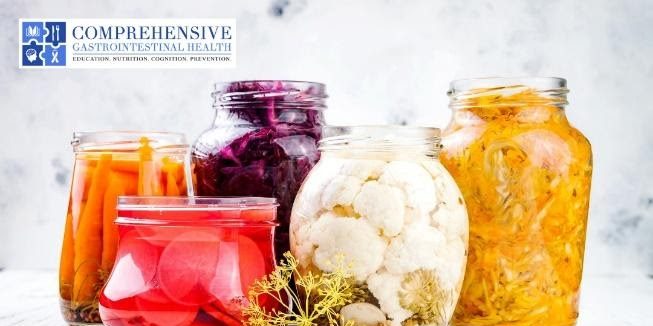PROBIOTICS AND PREBIOTICS MAY IMPROVE DEPRESSION

PROBIOTICS AND PREBIOTICS MAY IMPROVE DEPRESSION
Check out this fascinating article in Healio about a systematic review published in BMJ Nutrition, Prevention & Health that showed “probiotics alone or combined with prebiotics may alleviate depression”. For a refresher on what these are:
PROBIOTICS are live organisms that offer health benefits when consumed in adequate amounts. Scientific evidence suggests that probiotics may offer benefits such as reducing antibiotic associated diarrhea, improving mild to moderate irritable bowel syndrome (IBS) and other digestive symptoms. Food sources of probiotics include fermented fruits, vegetables, beverages and dairy products.
PREBIOTICS are non-digestible food components that promote the growth of good bacteria in your gut. Simply put, they are the food for the healthy bacteria in your gut! Prebiotics are naturally found in many plant-based, fiber-rich foods such as resistant starches, acacia fiber, cocoa powder and honey. Inulin, a fibrous carbohydrate, is another excellent source which is found naturally in certain vegetables or can be added to smoothies in powder form.
Healio: Probiotics, prebiotics may improve depression symptoms
“The growing appreciation of the interconnectedness between the [gastrointestinal tract] microbiome and the nervous system, combined with the knowledge that pre/probiotics can alter the condition and constitution of the [gastrointestinal tract] microbiome, has highlighted pre/probiotics as potentially therapeutically valuable agents in the treatment of certain psychiatric conditions,” Sanjay Noonan, of Brighton and Sussex Medical School in the U.K., and colleagues wrote.”
“Among 71 reviewed studies, seven met all inclusion criteria. All seven investigated one or more probiotic strain, and four evaluated the effect of combinations of multiple strains. Among the selected studies, 12 probiotic strains were featured, including Lactobacillus acidophilus, Lactobacillus casei and Bifidobacterium bifidium. One study examined prebiotic therapy alone, and one study examined combined pre-probiotic treatment.
Results of all included studies showed significant improvement in anxiety symptoms and/or clinically relevant changes in biochemical measures of anxiety and/or depression with probiotic or pre-probiotic use compared with no treatment/placebo or when compared with baseline measurements.
“These preliminary findings suggest continued investigation, on a larger scale and over a longer time period, would be appropriate,” Noonan and colleagues wrote. “However, purely from the information gathered in this review, it is valid to suggest that, for patients with clinically recognized depression, isolate, or adjuvant, prebiotic therapy is unlikely to affect an individual’s experience of their condition in a quantitatively evident way; and that isolate, or adjuvant, probiotic/combined prebiotic–probiotic therapy may offer a quantitatively measurable improvement in parameters relating to depression.”
If you or someone you know would like to get on the road to healthier eating and learn how powerful food as medicine can be, please contact us today. We have a fantastic team including a registered dietitian, nurse practitioner, and behavioral counselor here to help support the use of whole foods in your diet, investigate laboratory abnormalities, and help you develop lifelong habits for improving your health and optimizing the state of your gut microbiome.
Call us at 224.407.4400 or visit our website www.compgihealth.com to request an appointment with any of our providers to get started! TELEMEDICINE visits are available now!
